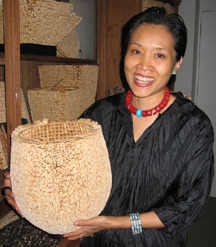 If “doing well by doing good” is a measure of success, Khun Pawinee of Ayodhya must be doing well indeed. Her Ayodhya designs make resplendent use of water hyacinth, a plant that is normally seen as a fast-breeding threat to navigable waterways. She employs hundreds of families in processing the vines for production, providing economic solutions for country families and helping to solve a navigation crisis in the bargain.
If “doing well by doing good” is a measure of success, Khun Pawinee of Ayodhya must be doing well indeed. Her Ayodhya designs make resplendent use of water hyacinth, a plant that is normally seen as a fast-breeding threat to navigable waterways. She employs hundreds of families in processing the vines for production, providing economic solutions for country families and helping to solve a navigation crisis in the bargain.
Perhaps the most striking element of Ayodhya’s houseware products are the astounding selection of textures, from the cork-like endpieces of the hyacinth that can be found on bowls and rugs, to the intricate weavings found on boxes. These unique pieces are a feast for the eye, and are displayed in Khun Pawinee’s beautifully designed clean, uncluttered shop interiors in Bangkok and Chiang Mai.
Her story
Khun Pawinee was born in Bangkok, one of six children. Her father, a Thai Air Force Marshal, raised the family in an open-minded manner along with Pawinee’s mother, who sewed clothes for the family. Pawinee began drawing and painting at an early age, and, finding an early affinity for architecture, began drawing trees for her cousin’s architectural plans.
She entered Bangkok’s Silpakorn University to study interior design and architecture, and received her Bachelor of Fine Arts degree in Decorative Arts in 1976. She founded Sahacha, Ltd. architectural and interior design firm in 1979. In 1989, after having spent two years researching the feasibility of utilizing water hyacinth as a commercial resource, she co-founded Yothaka International Co., Ltd., which sells furniture utilizing the plant. In 1995, she founded Ayodhya Ltd., which distributes water hyancinth-based designs world wide, and operates retail shops within Thailand.
The water-hyancinth story is a fascinating look at the process of building a sustainable, ecologically-friendly product line that benefits local economies in several ways. The project began with the Friends of Women’s World Banking Association in Thailand (FWWBT), who funded Pawinee’s research as to the feasibility of using water hyacinth stem as raw material for furniture manufacturing. The raw material was found in abundance in Lake Phayao in northern Thailand, where its rapid growth presented a generations-old problem in navigating blocked waterways. Pawinee’s work included studying potential ways of processing hyacinth, investigating the effect of mold on the material, and dealing with variation in color.
Human resource issues were important as well, in determining the best localities for processing, where workers would be motivated to do the work. She experimented with sewing, weaving, and placing the material on frames. Finally, she developed prototype room displays, and opened her first Yothaka shop at Peninsula Plaza, adjacent to Bangkok’s Chao Phraya river.
In 1995, she opened her first Ayodhya shop, specializing in high-design housewares, including baskets, bowls, placemats, rugs, and small boxes. Together, the Yotaka furniture and Ayodhya houseware lines have utilized over 7 million meters of water hyacinth, supplied by over 500 families, and processed by over 200 workers. The material is cut, dried on off-season rice paddies, then woven in the workers’ spare time.
Along the way, Pawinee’s managed to keep busy working on side projects that interested her, one of which was the traditional Thai design of the Shangri-La Hotel shuttle boat on the Chao Phraya, done in 1990. She also developed the interior design prototype of the Jim Thompson shop’s local and overseas branches.
As an important social contribution, she designed and manufactured handicrafts and furniture using the warehoused products of Her Majesty Queen Sirikit’s SUPPORT Foundation. The final product was twenty sets of furniture, auctioned to support the Queen’s initiative for training villagers to grow and process native materials, and produce crafts that will economically benefit their families and communities. The auction raised more than 100 million baht for the program.
Design philosophy
“I’m a texture person, and need to see variations… sometimes ceramic textures inspire me, and I test everything myself, from weaving through design. I always have at least four or five designs in process, then pick the one that interests me the most.”
“There has to be a lot of balance in selecting a product… can we make it affordable, and also pay our workers well? We experiment with a prototype for two months to determine if all the factors are there to make the product work, commercially. Every year, we strive to differentiate our products, looking for new designs, new ways of processing the material… we have a new collection each year, with our focus on designing exciting products that will appeal to the world market.”
“I’d like visitors to our shops to appreciate the idea that in buying beautifully designed housewares and furniture, that they’re also benefiting Thai villages and workers, and helping to raise their standard of living.”
Ayodhya designs are available in Bangkok at:
Ayodhya
Third Floor, Gaysorn Plaza
BTS Skytrain Chitlom station
Tel: (02) 656-1089
Ayodhya boutique
Exotique Thai shop
Emporium, 4th Floor
BTS Skytrain Phrom Phong station
Panta
Siam Discovery Center, 4th Floor
BTS Skytrain Siam station
Tel: (02) 658-0415
Ayodhya designs are available in Chiang Mai at:
Ayodhya
Nimmanhemin Soi 1
Chiang Mai
Tel: (053) 358-249
GPS: N18°47.984’ E098°58.062’
Leave a Reply